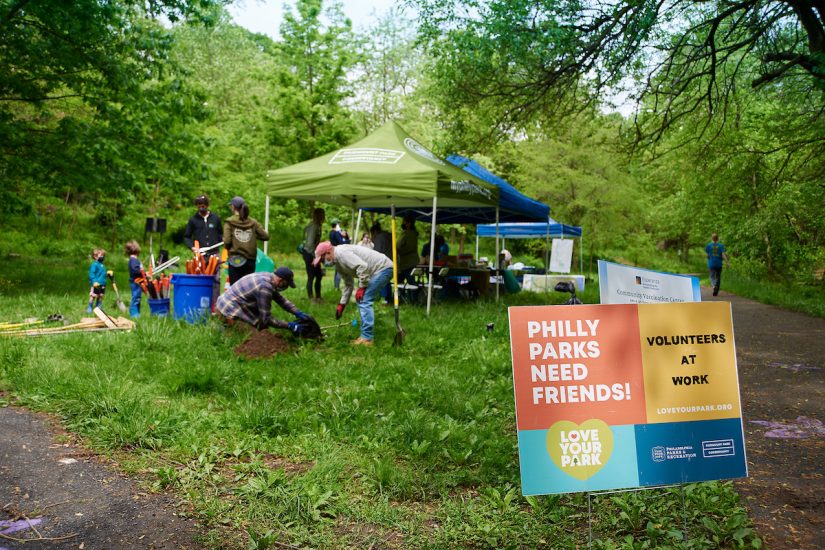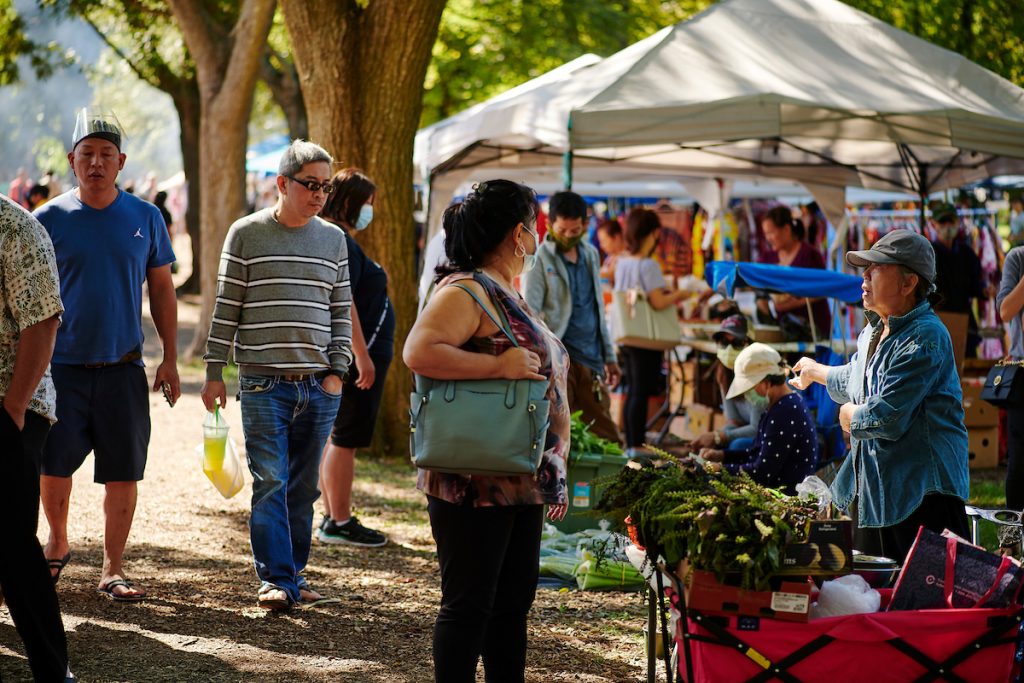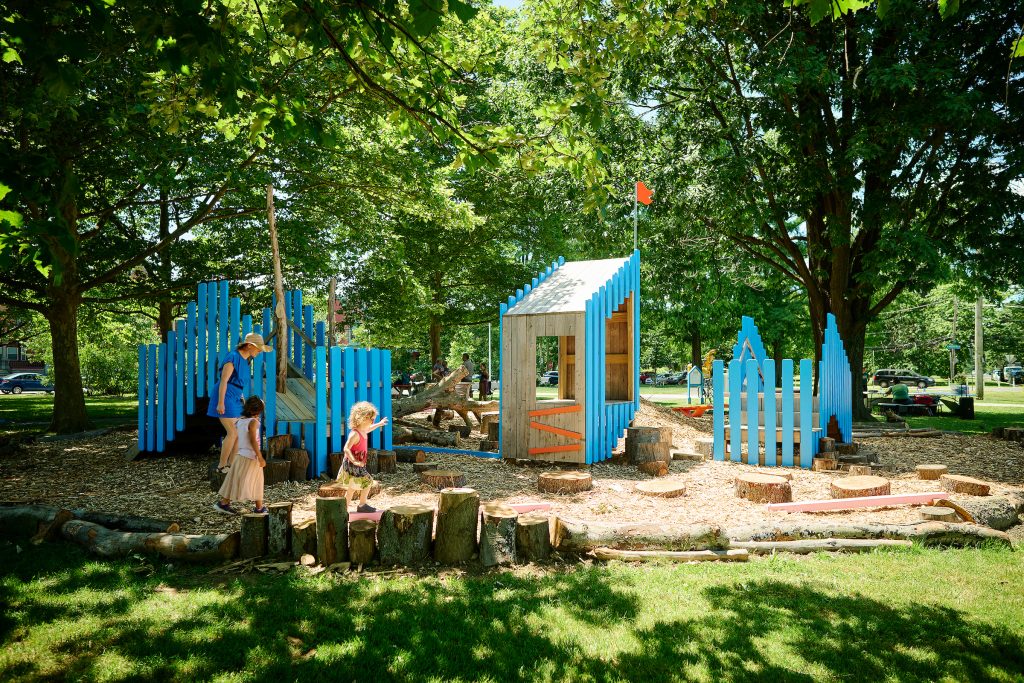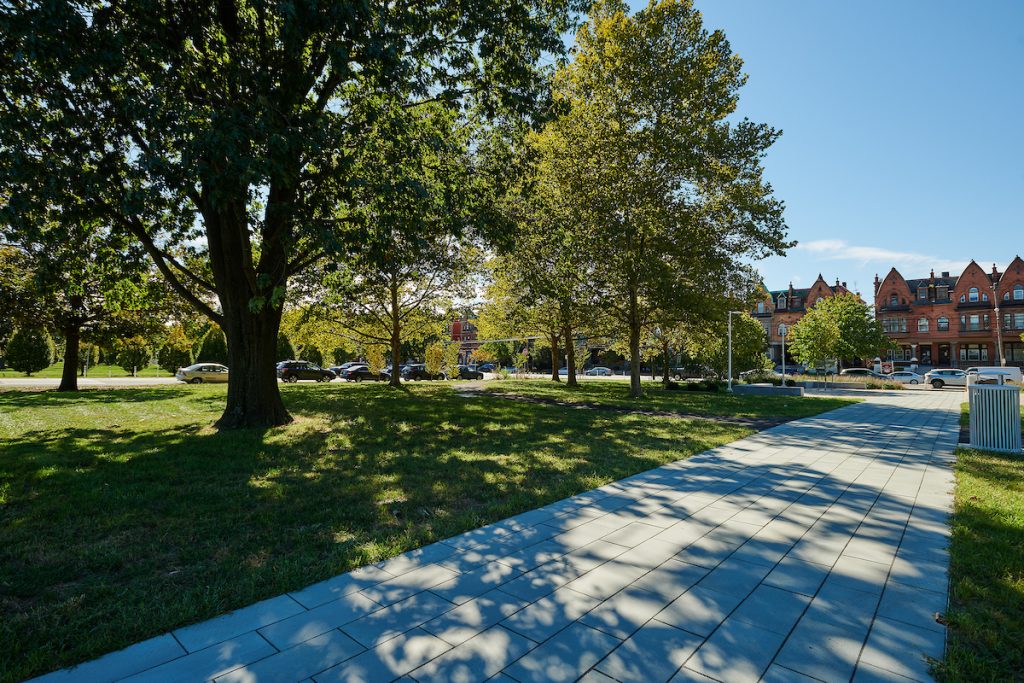As a Philadelphian, you are lucky enough to enjoy one of the nation’s largest park systems – 10,000 acres comprising everything from jewel-box pocket parks to sprawling landscapes to historic squares and innovative playgrounds.
Those parks — plantings, infrastructure, events calendar, lighting — are the result of a team effort by city workers, nonprofit organizations, and horticulturists. And maybe most importantly, Philadelphia’s parks thrive thanks to the work of local volunteers. There are over 140 registered Park Friends Groups across the city. They fill in the funding gaps with volunteer labor and cultivate community in their neighborhoods.
This year the Park Friends Network is celebrating its 30th anniversary. A special partnership between Philadelphia Parks & Recreation (PPR) and Fairmount Park Conservancy, the Network is the lifeblood of the city’s parks system. More than ever, it is volunteer support and creative nonprofit partnerships that ensure our green spaces flourish. If you live in Philadelphia, then you have a local park — and it could use your help.
Tender love and care
Greg Colujun (known by most as Mr. Greg) has been there since the beginning. He’s the longtime president of the Friends of Malcolm X Memorial Park in West Philadelphia. Founded in 1903 as Black Oak Park, the space was rededicated in 1993. That same year, the park’s Friends Group became one of the inaugural members to join the Park Friends Network.
Mr. Greg planned for a one to two-year tenure as president — instead, he’s still running the show. He does it for his community.
“It’s a win all the way around for our neighborhood,” he says. “My thing was for the children and for the seniors. Parents know that the kids are safe in the park. The seniors, they can come out to the park for a couple hours, sit down and talk to each other, and have a good time without being bothered. It was a long road, but I think we did a good job.”
He has help from the next generation, which is a theme in many of the city’s Park Friends Groups. Chinere Wright was a We Walk PHL leader (a program in partnership between the Conservancy, the Philadelphia Department of Public Health, and PPR) and her strolls often took her through Malcolm X Memorial Park.
“During the walks, I would notice that the park needed a cleanup and things like that, and just wanted to be a little bit more involved,” she recalls. “I actually live in the neighborhood and work in the neighborhood. That is my closest park and walking distance to where I have a six-year-old daughter. I just noticed that it needed a little bit of tender love and care.”
Members of her walking group heard her and pointed out Mr. Greg, saying, “That’s who you want to talk to. That’s the mayor of Malcolm X Park.”
Once she joined the Park Friends Group, Wright updated the group’s website and social media. She had often felt frustrated when she didn’t know about a cool event happening in the park and now she could solve the problem. Volunteering has inspired her to develop a wide range of unexpected skills such as grant writing and inbox management.
And Friends of Malcolm X Memorial Park could always use more help, even if it’s just a great idea or a helpful suggestion.
“If you’re interested in trying to make this a clean and safe park, come to a meeting,” says Mr. Greg. “People say, ‘Oh, Mr. Greg, he did this.’ No, I didn’t do it. This isn’t my park just because I’m the president. It’s your park because it’s in your neighborhood and your community. Come out and let us know what’s going on. Tell us how you feel about it.”
Whistle while we work
That theme of wearing multiple hats is echoed in all the Friends Groups. Members take on roles from marketer, to horticulturist, to politician, to event planner.
That’s certainly the case for John Boyce, who started working as a mailman in Roxborough in 1987. His delivery route went right past Gorgas Park.
“It was badly neglected and was not cared for,” recalls Boyce. “There were limbs down all over the place. There was trash everywhere. And for Roxborough, this is our ‘Central Park’ right in the heart of the neighborhood.”
Boyce became a founding member of the Friends of Gorgas Park. The group started off pruning trees and cleaning up trash but soon got to work applying for funds from the city and local foundations to revitalize the park. They fixed up the historic park building, which houses bathrooms and a kitchen. They got money for a new playground. They established a pollinator garden. They planted 25 trees as part of an Earth Day initiative — kids from the neighborhood helped out and buried a time capsule underneath each one.
Gorgas Park is once again a hub of the neighborhood, hosting a summer concert series, festivals, and youth sports. Local college student groups and retirees arrive for early morning and evening gardening sessions.
“We just keep trying to improve it,” says Boyce, who has been volunteering his time for over 30 years. “It’s beyond my expectations. I make friends all the time. I see new people. The neighborhood is evolving. It’s exciting, it’s fun, it’s stimulating — and it’s work. But we whistle while we work, you know. We have a good time together.”
Boyce has relied on the next generation for help with social media and spreading the word, but he has also tapped into his own latent talents.
“I had a college degree in English and then I started delivering mail,” he explains. “So when I got involved with the park, it allowed me to use a lot of my writing skills, communication skills, and people skills.”
He’s incredibly proud of what they’ve been able to do, especially in a neighborhood where most people have a backyard — they need a reason to come to the park. And sometimes the benefits extend even to those who stay home.
“You know, it just blows people away,” he says. “When concerts happen, the amplified music goes out into the neighborhood. And there are a lot of houses nearby and some people don’t feel like coming to the park. They’ll listen on their porch and they’ll say, ‘I heard the concert the other night. It was great.’”
Growth is good
Fernhill Park in Southwest Germantown is the second largest neighborhood park in the city. It boasts 50 acres of rolling hills, sports fields, play space, a paved walking path, and even a “food forest,” a plot of land where volunteers grow free organic vegetables for local neighbors.
“I’m a new homeowner,” says Sumanya Narra, who moved to the area two years ago. “I got involved to get to know my neighbors and get to know my community here. I only see benefits. You have good relationships. You feel safer. And you’re able to enjoy all kinds of recreational nature-related outdoor activities with people that you care about.”
The original Friends of Fernhill Park was created in the first wave of groups 30 years ago. For years, Pat Urevick and Jessamyn Melnicoff spearheaded the group, but now a new wave of passionate young people like Narra are jumping into the fray. The changing of the guard has been an intentional process, as members work to balance fresh ideas with respect for the group’s traditions.
“I imagine [Pat and Jess] have gone through different seasons of their lives, with kids and grandkids,” says Narra. “They’ve always been the ones who showed up and were committed every single time. When we joined, we always told them, ‘You’ve been doing this for so many years. You deserve to have a break. You deserve to sit back, relax, and enjoy.’”
The new leadership, which also includes Mekia Matthews, surveyed the neighbors to see what they’d like to see happen in the park. They’ve added new events, stocked a Little Library, hosted Playstreets, organized a massive fall festival, launched a coat drive, and even sponsored an upcoming girls soccer league. In a particularly exciting development, Fernhill was recently awarded a $104,000 grant to supplement its 30-year-old playground.
Matthews has lived in the neighborhood for over three decades — she currently resides in her childhood home — but it took a bulletin board flyer to lead her to the Friends of Fernhill Park.
“It’s full of all these amenities, but it’s also full of benevolent people,” she says of the park. “Our Friends Group includes some of the most loving, compassionate, caring people that I’ve ever met in my life. It’s very familial. It’s a sanctuary in its own right.”
That feeling of connection — to nature, to neighbors, to the city — is what makes all the hard work worth it.
“I just think that it makes the quality of life so much more beautiful,” says Narra. “It’s just more joyous to go for a walk. I call it the Fernhill curse — when you step outside your doorstep, you might have something to do on a certain timeline, but you’ll bump into three neighbors on your way and get into a conversation.”
We can do it, too
Despite living only four blocks from Carroll Park in West Philadelphia, Cheri Harrison hadn’t spent any time there. It just wasn’t part of her regular routine. For her, it was actually the opportunity to get involved with her community that changed her relationship with the park. At a neighborhood meeting, she heard about the Park Friends Network and joined forces with several other women from the neighborhood to launch a group. Soon she was in charge.
“And I don’t know what made me dive in,” she says with a laugh. “I just started taking the lead in a lot of things. I’m a good leader, but I don’t mind working in the background.”
Harrison looked around West Philadelphia and admired how some parks had become neighborhood hubs, giving locals access to public art, fresh food, and fresh air.
“I am a fan of Clark Park; I am a fan of Malcolm X Park,” she says. “I love the fact that in Clark Park, you can see Shakespeare and go to the farmers’ market. And then I started looking at Carroll Park as a place that we can do it, too. One of my slogans is ‘We’re trying to put the neighbor back into the neighborhood.’”
The original group of women who came together to start Friends of Carroll Park have remained committed. Harrison runs the group’s social media and liaises with PPR and the Conservancy. The vice president, Joyce, applies for grants, serves as treasurer, and even landed a paid position as a seasonal maintenance worker — she was already spending hours at the park cleaning up and decided to apply.
For Harrison, the connections she has made with her fellow volunteers are invaluable.
“We’ve become a family,” she explains. “It really started out as light work — ‘Oh, we just want to volunteer with the park’ — but now it’s our baby. Don’t mess with our baby. It’s been about six years and I feel as though we have a little bit of footing. It took a long time. Now we have families that continue to come back when we have our events. They’re looking forward to the goats coming to the park. They’re looking forward to the Halloween Trick or Treat and the National Night Out.”
It’s really something
That sentiment — that sometimes advocacy finds you as opposed to the other way around — is not an uncommon story in a city with so many close-knit neighborhoods.
Ruth Seeley’s involvement with Vernon Park in Germantown began during early morning weeding sessions with an elderly neighbor, timed to beat the mosquitos. That was step one. Step two came when the Tookany/Tacony-Frankford (TTF) Watershed Partnership was looking for a rain garden location in Northwest Philadelphia. They gathered local stakeholders to discuss how it would work.
“Somebody said, ‘What about maintenance once this thing is in place?’” she recalls. “Everybody looked around the room and said, ‘Well there’s Friends of Vernon Park.’ I knew that it didn’t really exist at the time.”
That project brought life back into the organization. Volunteers from around the neighborhood helped out with the rain garden and some of them stuck around.
Then Seeley attended her first Parks Friends Network meeting.
“It was fantastic,” she recalls. “I sat at a table with people from huge parks. People from pocket parks. People who’ve been doing this for years. People who were excited. People who were discouraged. It was a range of ages, backgrounds, economic levels, racial backgrounds — it was a real mix of people in the city right here in this room, sharing good ideas.”
To grow the energy in her own group, Seeley started walking through the park every day, talking to anybody she met. One of the new volunteers was Angela Miles, a younger neighbor who was looking for a way to connect.
“One of the largest benefits is the relationships that you make with your community,” says Miles. “Some people come with really a lot of knowledge about gardening and trees. Other people come because they see the space as a place to create fun programming for kids and families. I would just say that Vernon Park is a special place in our community because it doesn’t require any money. It’s outside commerce and it belongs to everyone.”
Seeley credits the younger generation with bringing new energy and creative ideas to Vernon Park. Almost every event is designed to be family-friendly, whether that means providing buckets of chalk, setting up a painting station, or staging a puppet show.
“You can only hope that some of them will grow up, stay in the neighborhood, and at some point bring their kids and say, ‘I had a great time when I was growing up in Vernon Park,’” she adds.
Seeley can see the impact she’s had on her neighborhood. It’s visible. It’s tangible. It towers above her.
“Sunday mornings as I walk through Vernon Park, and there’s a tree I pass in the far corner,” she says. “I planted that in 2010 and it’s a big tree now. I just hope other people sometimes get that same feeling because it’s really something. If you look around the park, you can see the huge old trees that were in the original estate. You can see the trees they planted in the 1990s when the group first got going, and you can see the ones we started planting 10 years ago, and even a couple new ones that still have the little fence around them. They’re struggling a bit, but they’re coming up.”
Do you want to get involved with your local park? If so, grow your community and visit LoveYourPark.org to find the Park Friends Group in your neighborhood.



